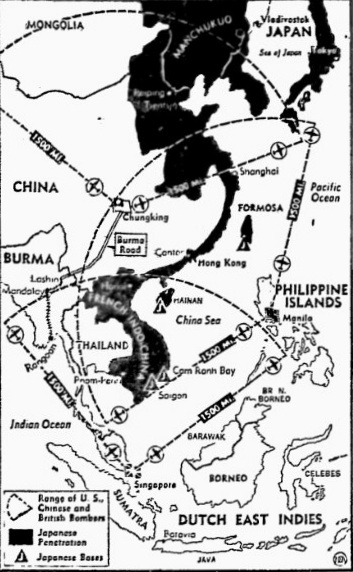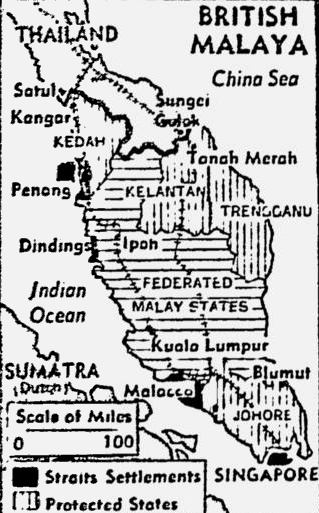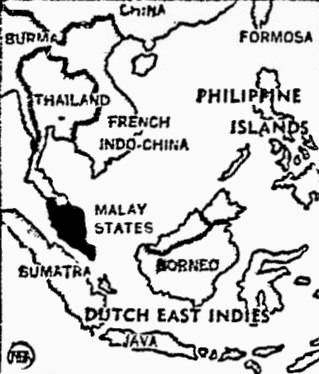Japanese Foreign Office (August 20, 1941)
[Secret]
From: Tokyo
To: Washington
August 20, 1941
Purple CA
#487 (Part 1 of 2)
Re the last part of your #705 [a].
We cannot, of course, predict what the outcome of the Russo-German war will be, but this does not preclude our anticipating the fact that in case Soviet Russia loses and as a result the Stalin Regime disintegrates, Far Eastern Russia will be thrown into political confusion. It is a self-evident fact that Japan is pressed with the necessity of taking precautionary measures for the sake of maintaining peace in the Far East as well as for the sake of Japan’s national defense and security, in view of the actuality that that part of Soviet Russia is adjacent to Japan and Manchukuo. Furthermore, since, due to the Russo-German war, there is a possibility of the influence of a third power being implanted in Far Eastern Soviet Russia, as for instance of Soviet Russia resorting to such unfriendly act as to allow the establishment of —----- and military bases in the Maritime province of Siberia or in Kamchataka, and consequently of the security of both Japan and Manchukuo being threatened, we need to prevent such a thing from happening.
The Japanese Government has decided to increase the Japanese forces in Manchukuo to the minimum number necessary to cope with such a possibility. On the other hand negotiations are being carried on in Tokyo with Soviet officials in order to arrive at a friendly solution of various matters having to do with this area. I understand that the Soviet officials have been instructed by the party leaders to be cautious in their attitude toward the forces stationed in Manchukuo. This is solely for your information.
Army 21234 Trans. 8/19/41 (S)
[a] S.I.S. #21165. NOMURA asks to be informed for his own information what the Japanese government intends to do with regard to her northern policy.
[Secret]
From: Tokyo
To: Washington
August 20, 1941
Purple (CA)
#487 (Part 2 of 2)
If the United States Government asks you questions concerning the increase of Japanese troops in the North, will you explain to them suitably as your own view of the matter what I have pointed out above. Impress upon their minds that the movement of the troops has for its objective purely preventive precautions against unforeseen emergency and that by it we will be able to forestall any possibility of peace in the Far East being disturbed.
Recently when the Soviet Ambassador in Tokyo inquired about this matter, I replied that so long as the Russian Government lives up to the treaty Japan also will be faithful to it. The Ambassador was very much pleased to hear this, saying that my statement had clarified the matter. This is solely for your information.
If it becomes definitely known that the United States is shipping iron, airplanes and other materials by way of Japanese coastal waters to assist Soviet Russia, this fact would unnecessarily provoke the feelings of the Japanese people, and it cannot be said that it will not have an unfavorable effect on the question of readjusting Japanese-American relations — a question which is at the present stage a very delicate one. We would like, therefore, to see the United States refrain from such action. Will you take a good opportunity and tactfully call the attention of the United States authorities to this fact. Today I personally called the attention of the American Ambassador to it.
Army 21235 Trans. 8/20/41 (S)
From: Panama (Akiyama)
To: Tokyo
August 20, 1941
J-19
#123
-
Please refer to (?) of my message #120 [a]. The Triomphant left Balboa for Tohita on the 17th according to report.
-
On the 19th two United States freighters and 1 British freighter were observed to transmit the Canal toward the Pacific.
ARMY #23342 Trans. 10/11/41 (2)
See S.I.S. #22813. Panama reports movements of ships through the Panama Canal.
From: Manila
To: Tokyo
August 20, 1941
Purple
#532
Re your Circular #1793 [a].
I am reporting to you below information which I have been able to get, though it may be somewhat incoherent.
-
There are many tall buildings in the city, to the upper stories of which admittance is forbidden. It is thought, therefore, that antiaircraft guns have been placed in them. It is fairly certain that guns have been placed on the Great Eastern Hotel (some have actually seen ten disguised machine guns on the top of it,) the (hitchcock?) Avenue Hotel (this is the former Marco Polo Hotel), and on the Insular Life and the Trading Commerce. Besides these, I presume guns have been placed on top of the Capitol, the Municipal Building, the post office, etc. (I believe that the army and the navy both have in their possession a map giving the locations of the tall buildings in the city.).
-
A person has seen during the evenings in the latter part of July, 36 anti-aircraft guns being transported to Camp Murphy.
ARMY 21461 Trans. 8/26/41 (6)
[a] Not available.
From: Manila
To: Tokyo
August 20, 1941
Purple
#533 (Report of Primary Importance)
Last March work was begun on the reparation of the airplane base south of Darurakku [a] on the way to San Miguel. For a time, however, the work was stopped. Lately it seems that the undertaking has been resumed.
Eye witnesses say that they are using about 300 employees and are hurrying the work along. I understand that at present the gliding ground is being prepared.
ARMY 21563 Trans. 8/28/41 (6)
[a] Kana spelling.
Japanese Foreign Office (August 22, 1941)
From: Davao (Kihara)
To: Tokyo
August 22, 1941
J-19
#104 (Intelligence of Primary Importance)
Because too much time would be required to fill in the paddy fields as originally planned in the construction of a new air base, it is rumored that these plans have been changed. Construction is to begin on an air base which will be laid down between the sea and the paddy fields where now stands a cocoanut grove. In order that bombing planes can use this air field, four concrete runways are to be constructed. It is understood that some 2,500 recruits from among the local populace will be used in this construction enterprise. Four or five hundred wheelbarrows which will be used in this construction work have already been unloaded onto the pier. When I last visited this area and made an investigation of the land they planned to use, it seemed to me that they would have to use more than three feet of dirt to fill in these paddy fields. A great deal of work will be entailed, I observe, in the cutting down and removal of the cocoanut trees in the grove.
ARMY 24063 Trans. 10/28/41 (6)
From: Davao (Kihara)
To: Tokyo
August 22, 1941
J-19
#107
-
During the middle of July a number of American destroyers entered the harbor of Jolo. We have intelligence to the effect that they came to this port from Hawaii, but we have no evidence to substantiate it.
-
During the last ten days of July, 6 American destroyers entered the ports of Jolo, [a] Kabunko [b] and Kanbin. [b] (Please refer to part 3 of my #32. [c]) While in the area of these three ports, they engaged in target practice with live ammunition.
-
During the middle of August, one large airplane capable of carrying 26 persons landed on the water in the vicinity of Jolo and was tied up there for a number of hours.
-
It is understood that there are approximately 2,000 drums of airplane gasoline stores within the military establishment at Jolo.
Furthermore, reports on the movements of war vessels in and out of the port of Jolo are prone to be delayed because of the existing conditions. Do you want me to send this sort of delayed information by urgent wire? Please wire.
ARMY 23958 Trans. 10-24-41 (6)
[a] Town on the island of the same name, one of the southernmost islands of the Philippine Island group.
[b] Kana spelling.
[c] Not available.
The Pittsburgh Press (August 23, 1941)
QUICK COLLAPSE SEEN FOR JAPAN IN BIG AIR WAR
…
Writer points out weak spots in aviation, production low
…
New York, Aug. 23 –
Lucien Zacharoff, in an article on Japanese air power in the September issue of Aviation magazine, says:
Japan would crumble like a house of cards if engaged in a great air war.
Mr. Zacharoff points out that Japan:
…is isolated from Axis fellow-aggressors, who have their hands full with their own adventures, her air industry is woefully weak and her air force is of low offensive strength and highly questionable as a factor in even defending her own cities.
The air force in Japan is divided between the army and the navy, These two air arms between them, according to informed sources, can muster a maximum first-line strength of less than 5,000 machines, although equally dependable commentators put the figure at no more than 3,000 workable military aircraft of all types, from trainers to frontline fighters. The pilots available to man those planes probably number 5,000.
Accident rate high
The writer says:
It sounds incredible that Japan’s seven army and navy air-training schools are graduating a total of much fewer than 1,000 pilots a year! The quality of their education may be appraised by the fact, admitted by Tokyo censors, that even in peacetime, the Japanese military and commercial fliers have the highest accident rate in the world.
Most of the leading Japanese military aircraft types are obsolete or obsolescent. The article points out that Japan more or less has had her way in the air over China principally because no flying equipment worthy of the name has been available to the Chinese. Japan is notorious for copying other countries’ blueprints of aircraft and aero engines, and this accounts for the obsolescence of her flying machines. The best and latest designs are guarded secrets and anything released for export to Japan, even by Germany, is at least three years old. Hence, Japanese aeronautical engineering lags by at least that much behind the rest of the powers.
Build 250 a month
The peculiar shortcomings of Japanese aviation stem from the inescapable necessity for air power to base itself on heavy industry of enormous capacity, what with immense replacements and reinforcements demanded by modern air service in combat. On this point, Aviation says:
Economic and military experts unanimously inform us that Japan’s current output of military aircraft of all types, including trainers, is about 250 a month, shared about equally by the army and navy.
Japan, over a period of years , has grown accustomed to depend for her industrial supplies on the very nations that are her likeliest adversaries in a possible armed clash – American and England. There was a time when Japan could also look for assistance to Germany in the event of war in the Pacific. But German aircraft could be sent to Japan only by shipment on the Trans-Siberian Railway or flown over Soviet territory; neither of these channels is now open due to the Nazi-Soviet war.
Evidence of Japanese engineering backwardness is the fact that while the leading designers in other parts of the world are introducing in their national air forces 2000 hp engines, the Japanese are still to produce their first 1000 hp motor.
Japanese Foreign Office (August 23, 1941)
[Secret]
From: Tokyo.
To: Washington.
23 August 1941
(Purple)
#497
From Financial Attaché Nishiyama (#70).
-
American inspection of Japanese firms and banks comes closer to being a search for “subversive acts” rather than an inspection connected with the freezing order. There was a marked difference in the Japanese inspection of American banks. Influential persons in the Specie Bank are much concerned and desire an investigation to ascertain just what the real purpose of the American officials is. Furthermore the National City Bank is arranging for the Kobe and Yokohama branches to unite with the Tokyo office and is closing out the Dairen office. According to Curtis’s explanation the above move is dictated by economic policy as was the case in the Osaka amalgamation and that there is no other reason for the move. Two or three young Americans will be left in the Tokyo office and the others will be returned home.
-
A proposal has been received from the British-Dutch Bank to exchange commodities for commodities in order to liquidate the bank’s accounts and this matter is being pressed by the head of the London branch of the Yokohama Specie Bank. However officials in the foreign office do not look with favor upon pushing negotiations to the solution of this one problem when there are so many other questions pending between Japan and Britain. Also the immediate conclusion of such an agreement would exert an unfortunate influence upon the leadership of public opinion hence orders have been issued not to ratify such an agreement.
(This item is for your information only).
21644
JD-1: 4860 (H) Navy Trans. 8-30-41 (S-TT)
From: Manila (Nihro)
To: Tokyo
23 August 1941
(Purple)
#543
-
Ships in port on the 23rd.
A. Manila.
Transports 6.
HON
PISU (Arrived the morning of the 23rd).
B. Cavite.
Destroyers 1. (Arrived from Manila on the 21st).
Transports GORUDOSTNA (entered port about a month ago
and is now under repairs.)
-
The oiler TORINIRCIC left harbor on the 22nd headed for Tarakan in order to take on oil.
-
Recently several destroyers and submarines have been stationed in the vicinity of Mariveles. We are investigating the number stationed at present.
-
Brig. General Cragette arrived here on the 20th apparently on the Dutch ship TIBADAEKY and had a conference with MacArthur on the 21st.
-
According to newspaper reports the CHANTO (formerly the Hilda Maersk) arrived here the 20th after having been repaired at Olongapo and her sister ship the KABARUNDO (formerly the Gertrude Maersk) is at present being repaired there. Hence the floating drydock must have been there formerly, however we will continue investigations.
-
On the 16th a ship which appeared to be the MADDO and two destroyers arrived in Cebu and all left that same night.
21518
JD-1: 4810 (H) Navy Trans. 8-27-41 (6-AR)


